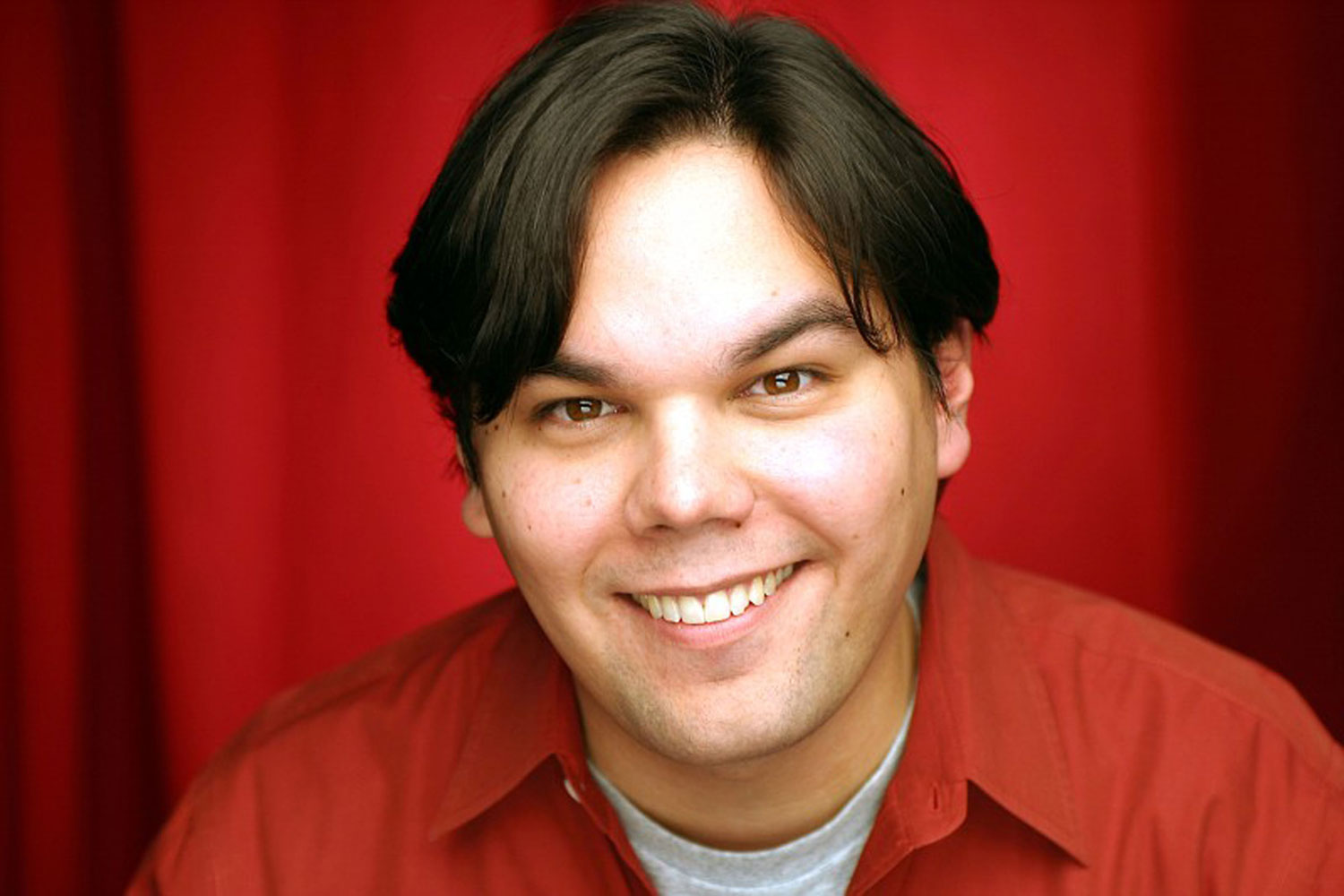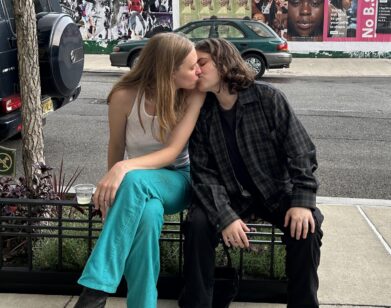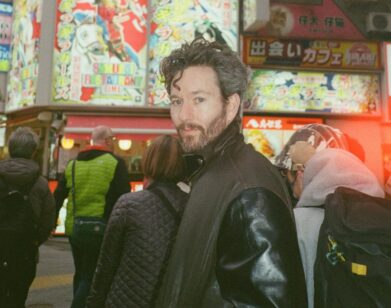The Book of Bobby

ROBERT LOPEZ
The Book of Mormon, written by by South Park creators Trey Parker and Matt Stone with Avenue Q’s co-creator Robert Lopez, might be the most irreverent musical to ever come to Broadway, and it might also be one of the best stories Broadway has seen in recent years. Somehow the “fuck you’s,” gay jokes, poop jokes, Star Wars references, scrotum maggots, earnest Mormon missionaries, and AIDS-plagued African villagers living in fear of warlords are not merely a recipe for hilarious and blasphemous lampoonery, but also a satisfying story of the human struggle to survive despite internal or external hardships. And it’s replete with dance numbers, exciting costume changes, psychedelic dream sequences, and harmonies, to boot. We spoke to Lopez a week after opening night.
DEENAH VOLLMER: How do you feel a week in from opening night?
ROBERT LOPEZ: It feels good! It’s very hard to go from the intense self-criticism you need to have during previews to all of a sudden letting go of it and trying to enjoy the moment, but I’m doing my best and I’m finally beginning to relax a little bit.
VOLLMER: How did you feel on opening night?
LOPEZ: We’ve always been confident in the show because we like it, and we’ve had the sense that audiences have been enjoying it, but you never know what the critics are going to say or how anything will be received, but we were cautiously optimistic. You can never assume that something is going to do well.
VOLLMER: How have you reacted to all this success the show has had so far?
LOPEZ: I’m surprised first of all that it’s been called “sweet” as much as it’s been called “callous.” That’s the last thing I expected to hear. I’m pretty well versed in Broadway musicals, and I was pretty confident that this was the most hardcore thing that they’d ever open on Broadway. It’s Matt [Stone] and Trey [Parker]’s imprimatur that girds people’s loins for something else. They go in expecting the worst and I think we gave them something they weren’t expecting: a sort of moral center and a heart and a message, and characters that we want the audience to care about.
VOLLMER: Yeah! I was really impressed that it all came together in a satisfying, story way, and it wasn’t just a string of funny jokes.
LOPEZ: Well, that’s the hardest part. You gotta make a story that makes sense, first of all, and then leaves you with something. The hardest part is just making the story make sense.
VOLLMER: Were there any subjects that were too taboo for even you guys?
LOPEZ: We didn’t think of it that way. We didn’t set out to shock anyone. We just wanted to make each other laugh, and that’s the kind of thing that we gravitated toward, that kind of humor. It’s just our taste. But, yeah, there was definitely stuff that felt like it was going over the line. Elder Price, that character, began as more of a guy you loved to hate, a character that had it coming. We tried darker endings for him, and darker jokes. We had him calling his family in the second act, and his dad just assuming that he wanted to come home because he was done with the mission and turned gay and was just sucking a lot of cock in Africa on the mission. And it was just this hilarious scene—that’s the one that I miss the most. But it didn’t feel right; it wasn’t in the tone of the show that we were writing, so we had to lose it.
VOLLMER: Did you guys have to censor yourselves for producers or anyone?
LOPEZ: No, Matt and Trey work in TV, which is heavily censored, but even they have a kind of a special relationship to their network—they kind of are the network, and they get away with almost everything that they want to. On Broadway there is no censoring, just self-censorship and doing what makes sense. And on Broadway, there is really no such thing as a successful show that does not give the audience an uplifting feeling. It would never work. If you’re doing a musical, you should be out to give the audience something special, emotional, an uplifting feeling, something that stays with them. And you’re not going to do that by bumming them out. It was really not us saying, “What can we get away with?” It was more us wanting to put on the best show that we could and being the people that we are, there’s some hardcore humor in it.
VOLLMER: So how is it possible that there is not even one polygamy joke?
LOPEZ: [laughs] Yeah, well, that’s too easy, first of all. That’s a really easy and done joke. Sometimes I watch the show and I don’t think that it’s a Mormon show, because there really aren’t any Mormon jokes.
VOLLMER: But in a way I think that’s nice because you end up poking fun at religion in general, rather than making Mormons the butt of all the jokes.
LOPEZ: Right. And that was our intent. Even though we were attracted to this idea of doing a musical about Mormons, Mormons are just a really, really fun and easy way of getting a discussion going about religion.
VOLLMER: So can you tell me about how you got involved with this production?
LOPEZ: Oh yeah! Well, Matt and Trey were in town—it must have been 2003—working on Team America with Scott Rudin, and Rudin mentioned to them that there was another puppet musical happening and that they should come see it. It was really early in the run of Avenue Q, and I introduced myself, and they really loved the show so we went out for a drink afterwards and started talking about what was next. They asked me what I wanted to do next and I said I was most excited about a Joseph Smith musical and they stared at me and said, “Really? Because that’s what we want to do next, too.” And they said, “Maybe we should do it together,” and I thought, “Yeah, sure. That’ll never happen.” It was really all three of us thinking of ideas separately and developing it together. It wasn’t like they decided to do a Broadway musical and hired me, which is what I assume everyone assumes. [laughs]
VOLLMER: Did you ever feel like a third wheel working with the two of them?
LOPEZ: No. As far as I can tell, they never work without anyone else in the room. They only collaborate with others. So, they’re really used to it, and I’m really used to that too. I think in comedy, you have to have others in the room. They were my heroes writing Avenue Q, because South Park had just come out, the movie, and it was a huge inspiration for me. It was like a monumental event in musical-theater history, as far as I’m concerned. There were times that I was intimidated to be working with them because I respected them so much, but they’re pretty good at diffusing that, and so it was just some guys in the room, working most of the time.
VOLLMER: I heard that you’re an advocate of “true” rhymes. How come you veered from that in this show?
LOPEZ: [laughs] Well, I’m not an advocate of true rhymes, I don’t think. I think that everyone who writes musical theater needs to know how to do true rhymes, because that’s the tradition of it, but I do think that in order for the art form to grow, it’s important to not let tradition get in the way of innovation. There’s all kinds of reasons not to use true rhyme in a lyric, like with off-color humor. If it comes out funny and perfect at the same time, it doesn’t match experience. When you rhyme a swear word perfectly it doesn’t sound like a swear, it sounds like someone writing clever, light verse. Since I was such a Sondheim devotee growing up, I began as a true rhyme advocate, but now I wouldn’t advocate it necessarily. I would say: learn to do it, but then break the rules.
VOLLMER: Can you tell me about what kind of research you did for the show?
LOPEZ: We did a lot of research, actually. We would use research as a procrastinating activity and an inspiration encourager. First we made a trip to Salt Lake City and talked to a lot of active missionaries who were in Salt Lake City doing their mission, and we’d go to restaurants and ask if any of the wait staff had been missionaries, and almost all of them were. And almost all of them were also gay, so it was a lot of inspiration for the part of the gay elder. We also watched a lot of missionary movies. There’s a whole sub-genre of Mormon films that are about missionaries. And I even befriended a Mormon missionary I found on Mormon.org or something like that. They had this little ask-a-missionary feature on their website where you could chat in real time, so I could online chat with a guy in Uganda, and I learned a lot from him.
VOLLMER: What was the most surprising thing that you found in your research?
LOPEZ: I think what was always surprising to me was when things that we kind of just wrote from character and divined on our own, like the “Turn It Off” song—we never really researched that, but then Mormons would come up to us and say, “That’s how we actually do it, that’s our experience…”
VOLLMER: Whoa…
LOPEZ: [laughs] That was surprising and gratifying. Another thing, Trey took a trip to Kampala just a few weeks before rehearsals started for the Broadway production, just to make sure that one of us had been there, because at that time the play was really set in Kampala, and he came back shocked a little bit at how unbelievably beautiful and upscale Kampala was as far as African cities. So we did a bit of clarifying research and found out that yes, there is a bad part of Uganda and that’s where we meant the boys to go, but it’s in the north, so we set it in the north. Even though I don’t think there is a mission up there. At some point you have to suspend your disbelief.
VOLLMER: So you’ve gotten some responses from some Mormons who saw it?
LOPEZ: Yeah! All during previews there were a lot of Mormons and Mormon writers that would come up to us after the show. I don’t think we heard anything negative. It was mostly all like, “Wow, how did you know? You really kind of nailed it.”
VOLLMER: Did you have a religious upbringing?
LOPEZ: Yeah, I was brought to Sunday school. My parents are both Catholic. I grew up in Greenwich Village, so the Catholic church there is really tolerant and heavily gay, so it didn’t feel like growing up Catholic. I took it seriously, and I was a little bit like Elder Price. I thought I was doing everything right, and I had this kind of personal relationship with God. When I got to college, I started singing in the Episcopal church for money. And you’d have days when you had to do two services, and it would just be like a two-show day doing the musical. It really is a musical. It’s stories, it’s music, it’s an audience. I started thinking of the mass as this crusty, old, terrible musical with a good score, but like a terrible story. [laughs] And the priests were just like, all right, let’s do another one! [laughs] For my young, idealistic self, it felt really cynical and I lost interest.
But after I thought about it more, I began to think of the Bible as literature. Part of it was this class I took in college with Harold Bloom about Shakespeare. The idea that the Bible is not this magic book that was written by God and beamed down to us or this golden plates that were dug up from a New York farm, but really the work of some storyteller that was inspired enough to see what people needed in their lives and give it to them. What’s a bigger miracle than a farmer writing a book that persuades hundreds of people to follow him across the county and die for him, you know? And allowed him to marry all those women. [laughs] I think that’s more of a miracle to me; it’s crazy.
VOLLMER: I know that you’re a big Star Wars geek, and there seems to be a lot of parallels between stories like the Bible and stories like Star Wars. Was it fun for you to kind of bring those things together, literally?
LOPEZ: Yeah, that was fun! When I made that decision to let Elder Cunningham be a fan boy, I thought it was an unnecessary layer, but I realized that it thematically fits with our whole show. Harold Bloom wrote that The Lord of the Rings reminds him of The Book of Mormon, and I think the idea of The Book of Mormon and The Lord of the Rings being literary siblings is really powerful. I mean, I still think about Star Wars and LOTR in that way, as a principle that can guide your life.
VOLLMER: Is there one particular moment in the show that continues to crack you up?
LOPEZ: I think one of my favorite moments is in “I Believe” when Elder Price actually gets to the warlord’s den and interlaces his fingers with him. [laughs] It’s just a moment that the actor added, but it brought the show to a whole new level.






